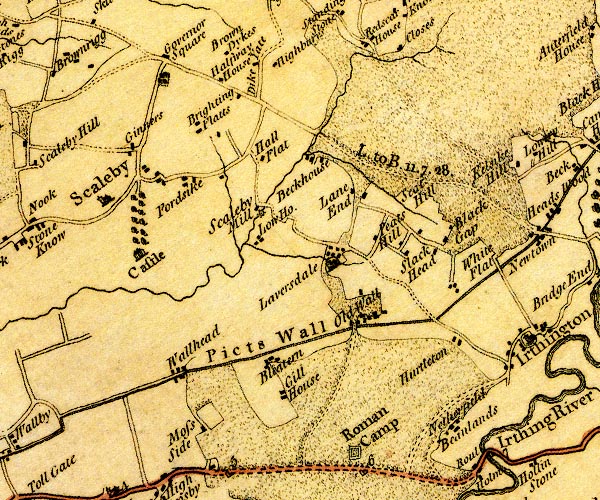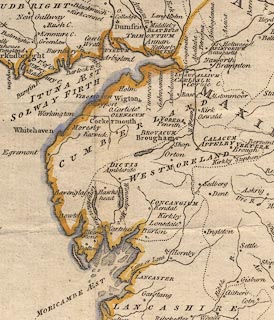




"CAMP (Site of)"

D4NY46SE.jpg
"Roman Camp"
square within a square; roman fort
item:- Carlisle Library : Map 2
Image © Carlisle Library
placename:- Aballaba
 click to enlarge
click to enlargePEN1Cm.jpg
"Aballaba"
square; roman camp on Hadrian's Wall
item:- private collection : 66
Image © see bottom of page
item:- roman inscription; inscription, roman; House Steeds
 goto source
goto sourcePage 203:- "..."
"At Old wall about two miles west from Cambeck fort are two inscriptions of the centurial kind:"
"LEG. II. AVG.
[V] IVLI. TE
RTVLLIA."
"and"
"[V] COISIL
NCINI."
"Mr. Horsley supposed them to belong to the station at Watch cross or somewhere by Scaleby castle. In the field called the House steeds near Watch cross, one of the altars now at Scaleby castle was ploughed up, but had no inscription on it. Another of the altars in the same castle, had been neglected till Mr. Gilpin took it into his garden. This had probably belonged to the same station."
placename:- Watchcross
 goto source
goto sourcePage 227, Mr Horsley:- "..."
""A little detached from the walls to the south is a Roman fort about four chains and a half square, called WATCHCROSS, and, as I was assured by the country people, and have had it since farther confirmed, a military way has gone near it, or between it and the military way belonging to the wall; for they often plow up paving stones here, and think part of the highway to Brampton to be upon it. This is the least station in the line of the wall, and is as much plundered of its stones as that at Brugh or Drumbrugh. However the ramparts and ditches are very fair and visible. It is about half a mile from Bleatern. The military way, which I just now mentioned, has gone from Cambeck or Carrvoran to Stanwicks, like a string to a bow. And so Watchcross stands here in much the same manner as Little Chesters does in Northumberland. Near Bleatern the walls runs through mossy ground, and the foundation here has been made with piles of wood. Hadrian's vallum goes round this bad ground, and runs at ten chains distance from Severus's wall.""
